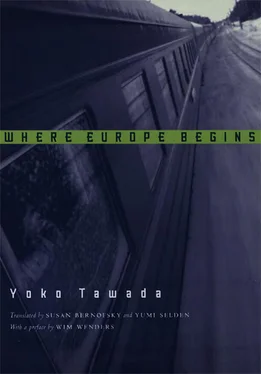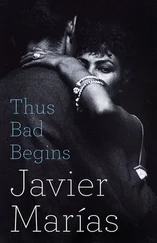At first glance, the city doesn’t strike me as particularly dangerous. Why, then, do so many women wear talismans on the street? Certainly it can get a bit spooky at times walking around the city alone. It’s just that too few people live here. Even during the day I’ve often walked home from the train station without seeing anyone at all.
If these bits of metal are supposed to be a talisman, why are they so popular among women? I didn’t know the name of the evil force these women were trying to protect themselves from with this talisman’s help. They never revealed its name to me, and I still haven’t made a concerted effort to find out what it is. Where I come from, people say you should never utter the name of a dangerous being aloud. If you do, this being will really appear. It has to be named indirectly. For example, you can simply replace its name with “it.”
Gilda, a student who also lived in my building, always wore a triangular piece of metal on her ear. The first time we had a real conversation, she told me that a fifty-five-year-old librarian at the university had just committed suicide the day before. Up until her death, this librarian had fought to keep computers from being installed in her department. The woman couldn’t have been intelligent, Gilda said, or she would have understood that computers are merely tools, not monsters. But apparently the computers weren’t the cause of her suicide. She’d been suffering from severe depression for years. She’d lived alone, Gilda said, fingering her little triangle of metal.
“What is the meaning of that piece of metal?” I asked. She looked at me in surprise and asked whether I meant her “earring.” The word “ring” had an unsettling effect on me. Gilda replied indifferently that the earring was simply a piece of jewelry and had no meaning at all.
As I had supposed, Gilda was reluctant to discuss the earrings significance. Instead she told me that highly educated women had holes put in their ears at a relatively late age, whereas working-class women started wearing earrings as girls.
I had read in a book that there are cultures in which part of the sexual organ is cut away during the initiation rite. A different part of the body can be substituted, however; the feet, for example, or the ears. In this case not the earring itself but merely the perforation of the earlobe would be significant.
But why was Gilda always so nervous? One day she placed two porcelain dogs on her windowsill. She refused to put the pots of flowers I’d given her there. These dogs were to sit on the windowsill all day long and stand guard over her apartment, like the stone dogs where I come from that guard the Shinto shrines. Gilda said she often had the feeling, when she was alone in the apartment, that a strange man was coming into her room through the window.
Once she knocked on my door in the middle of the night and said there was something wrong with her computer. I was really quite surprised she’d woken me up for this, since she knew I didn’t know the first thing about computers. But soon I understood what the matter was: Gilda claimed there was an alien being living inside her computer and producing sentences. She kept discovering sentences in her essays that she definitely hadn’t written herself. But she refused to give me any examples; she said the sentences were indecent. I advised her to attach a talisman to her computer to make the evil force leave and keep new ones from coming. I used the term “evil force” because I didn’t know what else to call it.
The talisman Gilda selected wasn’t at all what I’d had in mind; I’d imagined something like a doll made of reeds or a piece of snakeskin. But Gilda went to a health food store and purchased three stickers. Each sticker bore an image that was no doubt intended to epitomize the evil force: a car, a nuclear power plant, a gun. And above each image stood the words; No thanks.
It struck me as overly polite to express gratitude while rejecting an evil force, but perhaps the word “thanks” was simply intended to avoid provoking the opponent’s aggression.
Gilda pasted the stickers on the front of her computer, next to the screen, and appeared satisfied with them. A week later she bought three more stickers and put them on her bicycle, the refrigerator and the door of her apartment.
But I don’t think she was completely reassured. Her computer, it’s true, was now clean, but as if to make up for this, she began to feel as though an alien being were forcing its way into her body. She bought herself a sweater with a big tiger’s head on it. Everyone who approached her had to brave the tiger’s fierce gaze. Gilda also bought herself a jacket made from the skin of a dead animal. She wore tight pants printed in a leopard-skin pattern and a belt studded with several triangular bits of metal. It wouldn’t have surprised me if she’d put on a mask with a lion’s face.
Despite all this, her misgivings remained. At dinner, for instance, when she sat alone in the kitchen eating her soup, she suddenly had the impression that the soup contained everything she’d been trying to avoid all this time. She told me she’d decided to fast for a week or two. There were so many poisons in food, she explained, and, besides, she had too much excess flesh on her body. Gilda wasn’t fat, but she was incapable of loving her own flesh because she sensed within it the presence of an alien element. She called this element “chemicals.” Every culture has its own purification ceremony, or several of them. In this city, however, the ceremony has no predetermined day, time or opening prayer. There are no specifications, or at least no rules I could recognize as such. One day Gilda bought herself a book on fasting, and a few days later, when I met her on the stairs, she had already started. Her face looked less narrow than usual: it was almost round, as though there were water trapped beneath the skin. The piece of metal on her ear appeared heavier and colder than before. I swallowed the words I’d meant to say to her, for she seemed to me, all at once, like a stranger who — although I lived in her language — couldn’t have understood me.
On her door flapped a sticker that was trying to come unstuck from the smooth metal.
On Tuesdays I like to eat my father. He tastes of venison. Bread dough is what he’s made of. I know he’s really a woman. But you can’t say this to his face or his eyes will turn hollow. When the fire is hot and the sun goes down, his dead brother whispers in his ear; you’re a woman. He’s made of bread dough. His nipples are raisins. The eyes of a woman he went to see in prison yesterday were also raisins. My father has black nipples. I’ve never seen them, they are buried deep in the flesh of his chest. Like mother and daughter they lie side by side in a cold sweat. Once a day they wake up and leap out of his flesh like a scream. My father tells me about them because he knows I’ll like them. But he doesn’t show them to me, he presses them back into place before I open my eyes. Usually I eat my bread cold. As I chew I feel the warmth of his flesh. I chew and chew and imagine I am continuing to chew. In reality I stop chewing and look around and find the raisins in the oven. They are burnt and smell like the shadow of a stag. A woman once lived in this house. When my father moved in, she was abducted. I can no longer recall the woman's face. I feel annoyed and go on eating. I sit down on the chair and go on eating. I like eating my father. It makes him think of the woman and repeat her words, which he taught to her: Whoever sits on the chair must want to stand. Whoever stands in the kitchen must want to fly. I could fly without effort if I stopped eating. But I go on eating and grow heavier and heavier. I wish I were made of raisins. In the language of raisins I say: do not call me by a place name. Do not give me women's shoes. It is the night of the festival of girls. My father gives me a woman's spoon. I can’t sleep when my bed smells of burnt venison. My father tells me he used to be a man. When he ate bread from the oven, he became a woman. He shouldn’t have told me that. I knew everything about him. The bread dough told me ages ago. Now we can no longer go on eating under one roof I run away from home and have nothing left to eat. At the edge of town stands a house. The door is ajar. From the house comes the smell of venison. I go in and see a bed. It has three legs. In the bed lies my father, who can’t possibly be here. His belly is soft and warm. In his belly, my mother sleeps. I’d have to wait a long time for her to be born. He doesn’t want to let her go yet. Otherwise I’ll have to keep eating away at his belly until I reach her. I stand in the garden and ask the apple tree what will become of her. I can hear two people breathing in unison. One sleeps in the other’s belly. The belly is made of bread dough. I’m not hungry. I don’t have to be hungry to want to eat the bread. It is dark now, and the lantern casts the shadow of a hunter. If it is my father, I will kill him before he can shoot the sleeping woman. It is my father. I have no gun. He gives a cry and falls. A fatal bullet is embedded in his belly as proof of the murder. I didn’t do anything. From his belly, two raisin eyes peer out. Two people are dead, and the third survives.
Читать дальше












